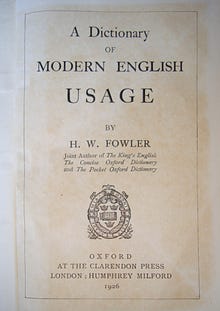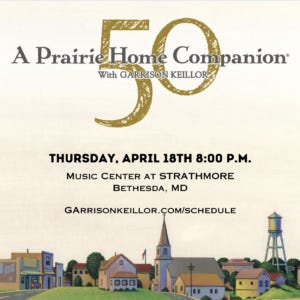|
 |
The Writer's Almanac from Sunday, March 10, 2013
"My Father Comes to the City" by Joyce Sutphen, from Straight Out of View. © Beacon Press, 1995.
ORIGINAL TEXT AND AUDIO - 2013
It's the birthday of a man called a "lexicographical genius" by the London Times, Henry Watson Fowler, born in Tonbridge, England (1858), most famous as the author of A Dictionary of Modern English Usage, which he published in 1926. His style guide — now generally referred to as "Fowler's Modern English Usage" or even just "Fowler's" — has sold more than a million copies. Shortly after it was first published, New Yorker magazine editor Harold Ross was compulsively consulting Fowler's guide to compensate for his own lack of formal education.
Poet T.S. Eliot prescribed that "every person who wishes to write ought to read [Fowler's guide] for a quarter of an hour every night before going to bed."
The usage guide was not Fowler's first book, nor was writing his first career. He taught Latin and Greek and English grammar at an Anglican boys' school for almost two decades until, at the age of 41, he had a philosophical or religious crisis or both. He decided that since he was agnostic he could not in good faith keep propagating Church of England theology and sending his students off to the sacrament of confirmation. So he moved to an island in the English Channel, where he lived a mostly solitary life in a one-room cottage next door to his brother, a tomato farmer.
He and his brother did a translation of ancient Greek satirical writings for Oxford Press. Then they collaborated on The King's English (1906), also for Oxford University Press, which they called "a sort of English composition manual, from the negative point of view, for journalists & amateur writers." At the beginning, it advises that writers pass up the temptation for showiness, and to be instead "direct, simple, brief, vigorous, and lucid." The chapter on "Vocabulary" decrees:
"Prefer the familiar word to the far-fetched. Prefer the concrete word to the abstract. Prefer the single word to the circumlocution. Prefer the short word to the long. Prefer the Saxon word to the Romantic."
It was a big success, and in many ways a precursor to Henry Fowler's 1926 guide, which he worked on alone since his brother died during World War I. There are a couple discussions on the use of Romance words in the 1926 guide, including one entitled "French Words," which reads: "Display of superior knowledge is as great a vulgarity as display of superior wealth."
The book is prescriptive, to be sure, 700 pages of instructions on what to do and what not to do in writing. But his book actually is not as stilted or overrun with formal convention as one might imagine. In fact, Fowler is okay with prepositions coming at the ends of sentences or with using "and" to start a sentence; he's not a stickler about the position of adverbs in sentences; and he's famously amenable to the split infinitive — so long as all of these traditional transgressions are done for the sake of improving a sentence's clarity and meaning. His bit on split infinitives has come to be one of the most famous passages in the book. He writes about it:
"The English-speaking world may be divided into (1) those who neither know nor care what a split infinitive is; (2) those who do not know, but care very much; (3) those who know & condemn; (4) those who know & approve; & (5) those who know and distinguish." He writes that while a split infinitive is "not desirable in itself" it is "preferable to either of two things, to real ambiguity, & to patent artificiality."
There are a number of other style guides in circulation today. William Safire's collections of columns "On Writing" are very much in the Fowler tradition. Strunk and White's The Elements of Style, published just over 50 years ago, has been popular for decades in American college composition classes. There's The Chicago Manual of Style, used often in American publishing, and The New York Times Manual, and the MLA Style Manual and MLA Handbook, current favorites among American academics.
Be well, do good work, and keep in touch.
We hope you can join us in Bethesda on April 18! Click on the image below for ticket details.
If you are a paid subscriber to The Writer's Almanac with Garrison Keillor, thank you! Your financial support is used to maintain these newsletters, websites, and archive. If you’re not yet a paid subscriber and would like to become one, support can be made through our garrisonkeillor.com store, by check to Prairie Home Productions, P.O. Box 2090, Minneapolis, MN 55402, or by clicking the SUBSCRIBE button. This financial support is not tax deductible.


